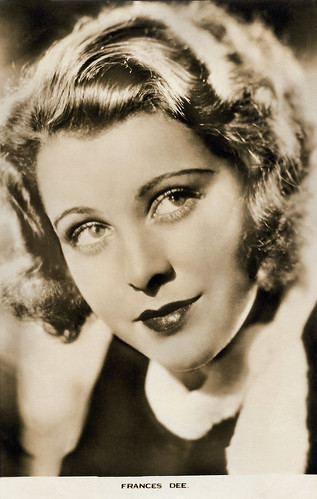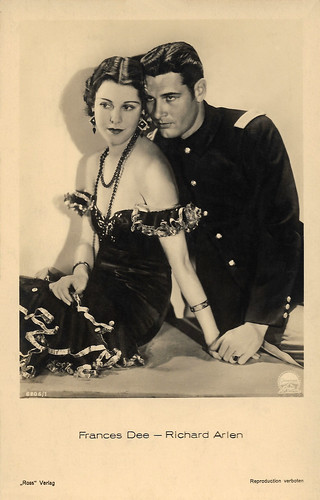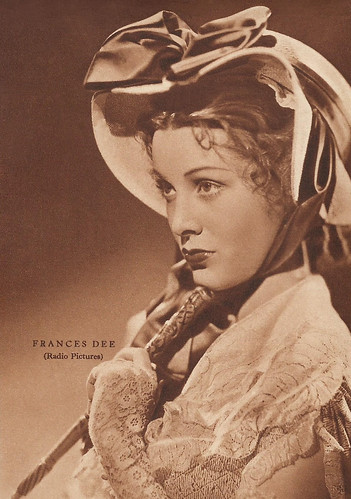
British postcard by Film Weekly, London.

French postcard by Cinémagazine-Edition, Oaris, no. 907. Photo: Paramount.

Italian postcard by Cinema-Illustrazione, Milano, series I, no. 21. Photo: Paramount.

British postcard, no. 93. Photo: Radio Pictures.
College girl
Frances Marion Dee was born in 1909 in Los Angeles, where her Army officer father, Francis Marion Dee, was stationed, but she grew up in Chicago after her father was transferred there.
After receiving her high school diploma in 1927, she studied at the University of Chicago for two years. In 1929, her father was re-assigned to L.A. When the 19-year-old Dee heard that Fox was making a college picture she suggested that they should use her to get the right college atmosphere.
Fox listened and her debut was in Words and Music (James Tinling, 1929) with Lois Moran. Her looks brought her attention and she began working in motion pictures as an extra.
Her work in a minor role in Lubitsch's picture Monte Carlo (Ernst Lubitsch, 1930) attracted attention, and she was given the lead opposite Maurice Chevalier in Playboy of Paris (Ludwig Berger, 1930). The next year, she played one of the female leads in Josef von Sternberg's prestigious adaptation of Theodore Dreiser's An American Tragedy (1931), as the débutante whose desired lifestyle seduces a young man to murder to obtain it through her.
From then on she played principal parts in such important pictures as Little Women (George Cukor, 1933) with Katharine Hepburn, One Man's Journey (John S. Robertson, 1933) with Lionel Barrymore and Blood Money (Rowland Brown, 1933) with George Bancroft. During the shooting of The Silver Cord (John Cromwell, 1933), Frances Dee got into a relationship with her counterpart Joel McCrea and they wed that same year.

British postcard in the Cameo Series, London, no. KC 12. Photo: Paramount.

German postcard by Ross Verlag, no. 5552/1, 1930-1931. Photo: Paramount.

Dutch postcard. Photo: Paramount. Frances Dee and Maurice Chevalier in The Playboy of Paris (Ludwig Berger, 1930).

Dutch postcard, no. 93. Photo: Paramount. Frances Dee and Maurice Chevalier in The Playboy of Paris (Ludwig Berger, 1930).
A sensible, good-hearted woman
Frances Dee was typically cast as a sensible, good-hearted woman in support of larger-than-life female stars, including Bette Davis in Of Human Bondage (John Cromwell, 1934) and Miriam Hopkins in Becky Sharp (Rouben Mamoulian, 1935). Occasionally, she would assay a lead role in A-pictures, such as Frank Lloyd's If I Were King (Frank Lloyd, 1938), opposite Ronald Colman.
Dee was in several films produced by or associated with David O. Selznick. Still, ironically, she lost her chance to be in Selznick's greatest picture, Gone with the Wind (Victor Fleming, George Cukor, Sam Wood, 1939), due to her beauty.
Jon C. Hopwood at IMDb: "Selznick considered casting Dee as Melanie Wilkes, but backed off when he thought her beauty might overshadow newcomer Vivien Leigh. Olivia de Havilland got the role instead, won an Oscar nomination and went on to a highly successful career. Dee's career, in contrast, never reached its potential, although she remained a working actress in Hollywood for as long as she wanted."
A memorable film was Jacques Tourneur's low-budget thriller I Walked with a Zombie (1943). Dee said she accepted the role because of the fee as she wanted to buy her mother a new automobile. After making Gypsy Colt (Andrew Marton, 1954), she retired to devote herself to her husband and to raising their sons.
In 1935, she and her husband Joel McCrea separated but they soon reconciled. In 1966, he filed for divorce, charging her with cruelty; however, the couple stayed married till Joel McCrea died in 1990. Their son Jody McCrea (1934-2009) was also an actor. In 2004, Frances Dee died at a hospital in Norwalk, Connecticut, near the home of one of her sons, due to complications of a stroke. She was 94. She was survived by her three sons, six grandchildren and two great-grandchildren.

British postcard by De Reszke Cigarettes, no. 17.

German postcard by Ross Verlag, no. 6206/1, 1931-1932. Photo: Paramount. Frances Dee and Richard Arlen in Caught (Edward Sloman, 1931).

Dutch postcard by the Rialto Theatre, Amsterdam, 1934. Photo: Remaco Radio Picture. Katharine Hepburn, Joan Bennett, Frances Dee, Jean Parker and Spring Byington in Little Women (George Cukor, 1933). The Dutch title of the film and the book by Louise M. Alcott is Onder moeders vleugels.

Italian postcard by Rizzoli & C. Milano, 1938. Photo: Radio Pictures (RKO). Frances Dee in Becky Sharp (Rouben Mamoulian, 1935).
Sources|: Jon C. Hopwood (IMDb), Wikipedia (English and Dutch) and IMDb.
No comments:
Post a Comment